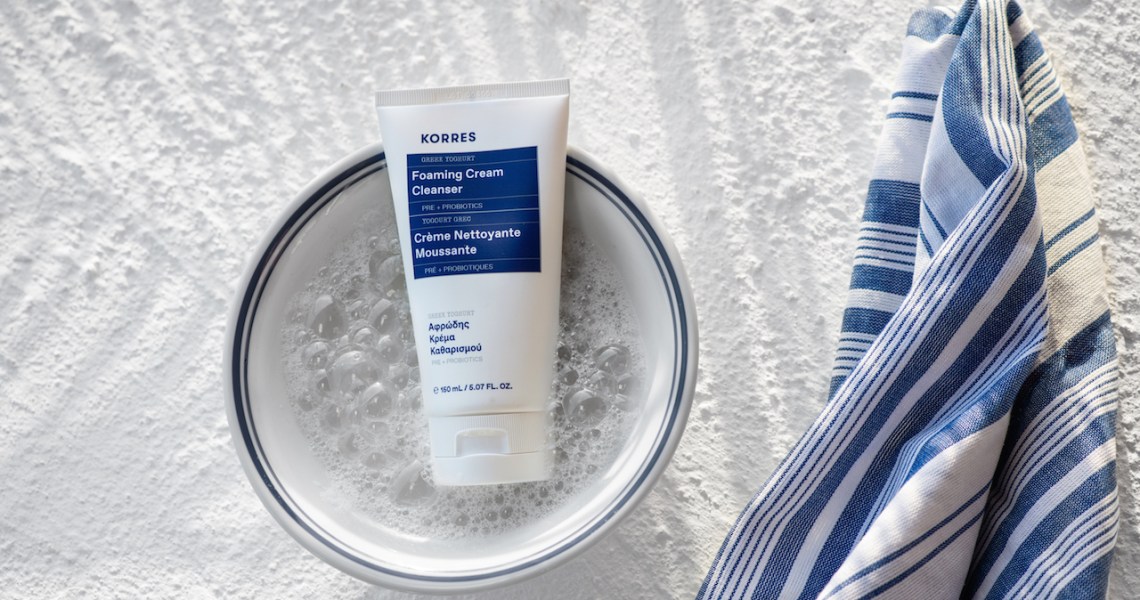Korres is trying to cozy up with Gen Z.
In January, the 25-year-old Greek skin-care brand entered into Ulta Beauty stores through the retailer’s Conscious Beauty program, following its Ulta.com launch in Dec. 2020. Korres is also sold at Sephora, HSN and Dermstore, among other retailers, but Ulta Beauty has gained traction among Gen-Z beauty customers. Using its hero product, the Greek Yogurt Foaming Cleanser, Korres plans to introduce Gen Z to the brand by highlighting across Instagram, TikTok and YouTube Korres’ Greek heritage, clean products and emphasis on skin health.
Lena Korres, Korres co-founder and gm of North America, said this is the first year that the brand is “significantly” investing in digital ads and paid social media, sharing that it will invest at least 20% of its overall sales back into marketing. Korres earned $30 million in U.S. sales in 2020 and $97 million globally. Korres said the 2021 sales goal is $120 million worldwide. In November 2017, Morgan Stanley invested over $56 million into Korres, which has allowed the brand to push further into international markets. In Jan. 2020, Korres launched a post-menopausal collection of products, though Korres said customer demographics are more evenly split between older baby-boomer and Gen-X customers and millennials.
“The Gen-Z consumer is the No. 1 priority for the brand’s growth,” she said. “They lead the trend toward sustainability, green and clean beauty, and this is where our [brand identity] lives. Secondly, we are underpenetrated in digital [sales] and social. It’s expected that brands have to go after that digital consumer, and that also helps the brand across all our sales channels.”
To kick off its Gen-Z targeting, Korres launched in early January a yearlong social media campaign across Instagram, TikTok and YouTube. It includes product giveaways, encouraging customers to DM for corresponding personalized recommendations, and unpaid influencer product gifting. Paid ads and unpaid social posts feature a 20% off code for the cleanser, references to the company’s Greek heritage, photos of Greek landscapes and close-ups of product textures. Korres began testing IG Reels in Nov. 2020, with videos featuring its yogurt cleanser.
Meanwhile, its TikTok strategy focuses on widespread seeding and paid influencer partnerships, rather than organic brand content. Korres will explore additional opportunities for interactive activations in 2021. This strategy is similar to its YouTube strategy, but with the added goal of building up Korres’ owned account.
“In 2021, we’re celebrating our roots and renewing our commitment to our customers and the planet,” said Donnie Soddu, Korres svp of marketing and digital. “We understand [customers’] expectation for one-on-one connections and that they are savvy when it comes to obvious advertising.”
Korres said that going after Gen Z makes sense because Korres’ value proposition aligns with the younger generation. For example, Korres’ yogurt cleanser rebalances the skin’s pH level and supports a healthy microbiome, which is a burgeoning proposition behind many brands that focus on gentler solutions for skin issues like acne. The brand has a farm-to-face process for ingredient sourcing in Greece and is a clean brand, based on Sephora’s and Ulta Beauty’s clean and conscious beauty standards.
According to a 2020 Mintel report on Gen-Z beauty trends, the beauty industry has taken a hit in sales due to Covid-19, but Gen Z is a bright spot due to their strong engagement. They are less concerned by a lack of open stores and purchase skin-care products from brands with self-care narratives. And much like millennials, they are also interested in clean beauty. Incumbent brands like acne-focused Clean & Clear and Rodan & Fields have taken notice and have sought to future-proof their brands with Gen-Z-focused offshoots. Brands like Kinship, Tula and German brand Babor’s Cleanformance collection all feature probiotics — a popular ingredient purported to support a healthy microbiome. And they all target Gen Z consumers.
“Talking to Gen Z is an elevated responsibility for beauty brands,” said Korres. “You have to take them by the hand and show them the good things for their skin. We have to tell them this product not only cleanses your skin, but it’s also sulfate-free, it’s soap-free, it doesn’t have any synthetic fragrance, and it’s very gentle. Plus there is science [behind it, because] it balances the microbiome.”




